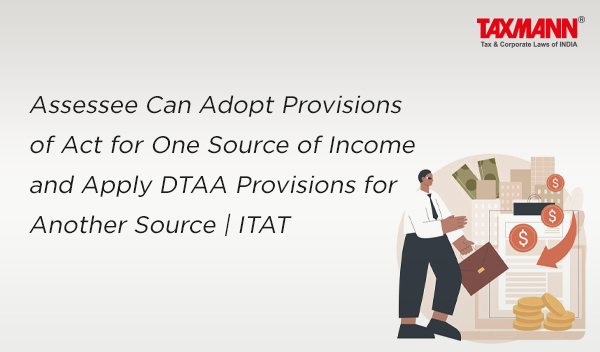Assessee Can Adopt Provisions of Act for One Source of Income and Apply DTAA Provisions for Another Source | ITAT
- Blog|News|Income Tax|
- 3 Min Read
- By Taxmann
- |
- Last Updated on 20 October, 2023

Case Details: Indium IV (Mauritius) Holdings Ltd. V. DCIT - [2023] 155 taxmann.com 336 (Mumbai-Trib.)
Judiciary and Counsel Details
-
- Amit Shukla, Judicial Member & S. Rifaur Rahman, Accountant Member
- Anish Thacker & Pranay Gandhi for the Assessee.
- Pankaj Mehta for the Respondent.
Facts of the Case
Assessee-company, a tax resident of Mauritius, was engaged in investment activities in India through the Foreign Direct Investment Route or through subsidiaries. During the year, it had earned gains and incurred losses on the alienation of shares of Indian companies.
It had claimed Short Term Capital Gain (STCG) as exempt from tax in India in accordance with article 13(4) of the India Mauritius DTAA. It sought to carry forward the Long Term Capital Loss (LTCL) under section 74(1).
The Assessing Officer (AO) rejected the assessee’s claim, observing that since capital gains derived by the assessee in India were exempt, the question of carrying forward capital losses from similar transactions doesn’t arise.
On appeal, the CIT(A) upheld the decision of the AO. Aggrieved by the order, an appeal was filed to Mumbai Tribunal.
ITAT Held
The Tribunal held that with regard to Choice of Act or Treaty Provisions is qua stream of Income, in terms of section 90(2), the assessee is eligible to apply the provisions of the Act or the Treaty, whichever is more beneficial to it. As per Article 13 of the India-Mauritius Treaty, gains derived by a resident of Mauritius from the alienation of shares shall be taxable only in Mauritius.
It is observed that the classification of capital assets between long-term and short-term is determined depending on the holding period. Further, taxation of Short Term Capital Gain (STCG) and Long Term Capital Gain (LTCG) is also governed under different sections being 111A in case of STCG and 112/112A in respect of LTCG. Accordingly, the scheme of the Act itself recognizes STCG/STCL and LTCG/LTCL to be separate and distinct sources of Income.
This distinction is highlighted upon perusal of section 70 governing intra-head set-off of current-year losses. Section 70 clarifies that the STCL can be carried forward or adjusted intrahead while the LTCL can be carried forward, but intra-head adjustment cannot be made against the STCL/STCG. Therefore, the Legislature has kept this difference in carry forward and intra-head adjustment separate for LTCG/LTCL and STCG/STCL.
On further perusal of section 70 to section 74, it can be seen that the Legislature has recognized LTCG/LTCL and STCG/STCL as two distinct sources owing to computational dissimilarities. Accordingly, the assessee, under the provisions of section 90(2), is eligible to claim the beneficial provisions of the Treaty in respect of STCG and with regard to LTCL, the assessee has the option to apply the provisions of section 74, accordingly chose to carry forward LTCL.
Therefore, the assessee was allowed to claim beneficial provisions of the India-Mauritius DTAA in respect of STCG and carry forward the LTCL as per section 74.
List of Cases Reviewed
-
- IBM World Trade Corpn. v. DDIT (IT) [2012] 20 taxmann.com 728 (Bangalore) (para 22)
- DIT (IT) v. IBM World Trade Corporation [2021] 436 ITR 641 (Karnataka) (para 22)
- Dimension Data Asia Pacific Pte. Ltd. v. DCIT (IT) [2018] 99 taxmann.com 270 (Mumbai) (para 22)
- JCIT v. Montgomery Emerging Markets Fund [2006] 100 ITD 217 (Mumbai) (SB) (para 22) – followed.
Disclaimer: The content/information published on the website is only for general information of the user and shall not be construed as legal advice. While the Taxmann has exercised reasonable efforts to ensure the veracity of information/content published, Taxmann shall be under no liability in any manner whatsoever for incorrect information, if any.

Taxmann Publications has a dedicated in-house Research & Editorial Team. This team consists of a team of Chartered Accountants, Company Secretaries, and Lawyers. This team works under the guidance and supervision of editor-in-chief Mr Rakesh Bhargava.
The Research and Editorial Team is responsible for developing reliable and accurate content for the readers. The team follows the six-sigma approach to achieve the benchmark of zero error in its publications and research platforms. The team ensures that the following publication guidelines are thoroughly followed while developing the content:
- The statutory material is obtained only from the authorized and reliable sources
- All the latest developments in the judicial and legislative fields are covered
- Prepare the analytical write-ups on current, controversial, and important issues to help the readers to understand the concept and its implications
- Every content published by Taxmann is complete, accurate and lucid
- All evidence-based statements are supported with proper reference to Section, Circular No., Notification No. or citations
- The golden rules of grammar, style and consistency are thoroughly followed
- Font and size that’s easy to read and remain consistent across all imprint and digital publications are applied



 CA | CS | CMA
CA | CS | CMA
